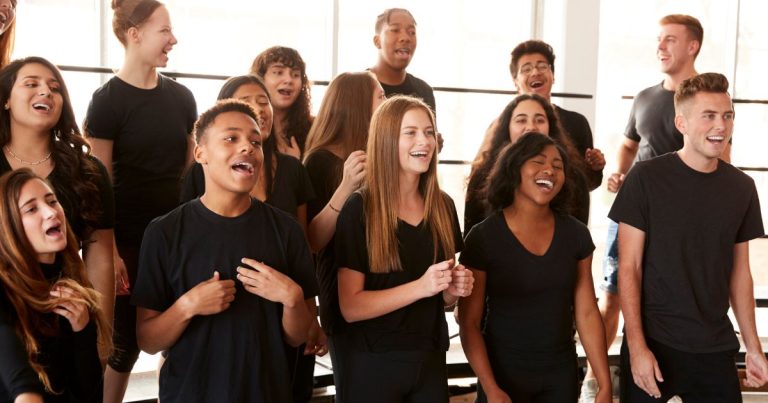Start your gospel music journey with this helpful guide explaining the history and principles of this influential genre.
Elvis Presley described it as “the purest thing there is on earth”.
Mahalia Jackson said it was “sung straight from the human heart”.
So how can singers and teachers drawn to gospel’s emotional intensity and uplifting power get started with the genre?
To find out, the Singing Teachers Talk podcast asked vocal coach and choir director Mark De-Lisser for an introduction to gospel music. Here’s what he had to say.
So what is gospel?
Gospel songs are songs of good news. It is music that challenges us, gives us a bright outlook and enables us to think about ourselves and others.
Do you have to be a churchgoer to sing gospel?
No, gospel is for everyone. If you don’t go to church or believe in Jesus, think about somebody or something that gives you strength or an idea that lifts you up. Whatever is important to you, sing it with that. Make it your story.
How did gospel originate and why does it matter?
The music came out of the spirituals, which were songs created and sung throughout the transatlantic slave trade.
The enslaved people were having conversations using different songs to talk about how they would get to freedom. The songs were written in code so that those who had enslaved them would not understand.
I will always ask singers to consider these things and acknowledge where the music has come from when they sing a gospel song.
If we’re teaching this stuff, we must let our students know who the composer was, and why and when the song was created.
What are the main principles of gospel?
It’s about storytelling. Those who were enslaved created songs out of the necessity to communicate to everybody on the plantation that they were going to try and get away.
But they were also written to uplift and bring joy in the moment. They are talking about their experience in that terrible period of time and how they can move out of that. Gospel is very much about the story and what the story means to you.
Why do audiences find gospel so uplifting?
A lot of the time, it is because the people on stage are singing their story.
From a teaching point of view, this is where I start. I will say: ‘You cannot sing this without believing it or changing the meaning of the lyrics in your mind to whatever it is you believe.’
If you connect, you will affect. You must connect to the lyrics, believe them, know them and allow them to resonate in you first. Do that, and as soon as the lyrics come out of your mouth, you will affect somebody who is listening to you.
Emotion
If you give yourself licence to be more vulnerable [when singing gospel], your audience will be affected even more. The more vulnerable you are, the more affected they will be.
I often ask students: ‘What does this mean to you? Can you give more? Can you allow me and your audience in more?’
And they always say: ‘But what happens if I cry?’ I say: ‘That’s perfect because it means you’re super invested, and your story is clear.’
If the tears come, don’t make any excuses. For me, that’s a great performance because it’s true.
How much consideration should singers give to technique when performing?
Do that in your rehearsal time. Understand the technique and how it works, of course. But when you come to perform, get rid of that – it’s all about feelings.
Who are some of the best gospel artists to listen to for inspiration?
Thomas A Dorsey was the godfather of gospel. If you start with him, listen to Precious Lord, Take My Hand.
Then you have Mahalia Jackson, who was around at the same time as Dorsey. Andrae Crouch came a little time after that.
Others to listen to include Walter Hawkins, Richard Smallwood, Maverick City, Daryl Coley, Donald Lawrence, Jonathan McReynolds, Take 6, Anita Wilson and Mary Mary.
Then you have the biggest gospel artist on the planet right now, Kirk Franklin.
Learn more
Take a deeper dive into gospel by tuning into the Singing Teachers Talk podcast, where Mark discusses his early introduction to music and his work with some of the industry’s top artists.




